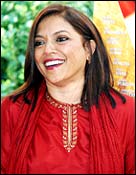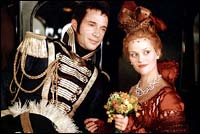 M
M
But William Makepeace Thackeray's 900-plus pages novel, a caustic and often amusing portrayal of upper class England ends, with short questions: 'Which of us is happy in this world? Which of us has his desire? Or, having it, is satisfied?'
Nair also saw plenty of politics in the novel, serialised in 1847-1848, in Britain. Kolkata-born Thackeray also examined how the great wealth from India and other colonies transformed his country in the early decades of the 19th century. But the director -- who read the book several times during the last three decades after being introduced to it by a Catholic nun when she was studying in Bhubaneshwar -- was also intrigued by the novel's spiritual quest.
She hopes that before the Shankar Mahadevan song and the scenes in Rajasthan unfold, she has taken viewers on a thought-provoking and enjoyable cinematic journey.
| |||||||||||
"Thackeray asks many essential questions in his novel, and many of them are spiritual questions, too," Nair says.
Nair adds that one of the reasons she dislikes the phrase 'period film' or 'period novel' is because her film is very contemporary. And the novel it is based on eternal questions.
"It asks the questions we ask ourselves today, and will continue asking throughout existence," she says: "Which of us has dreams? And when we achieve them, are we happy? And what is true contentment? These questions
Nair says that the timelessness of the film's theme is one of the main reasons that the $23 million Vanity Fair will find audiences across the globe. This is her most ambitious film so far. It will open across North America on September 1, making it her widest-released film, which will be in more than 1500 theaters. Her previous hit Monsoon Wedding, on the other hand, reached just about 500 theaters, grossing about $13 million.
"Period films, costume dramas bore me," she says with a sigh. "Good films like good books have to connect with today's world, even if the film was made 100 years ago or the book was written 200 years ago."
Her Kama Sutra though set in medieval India nudged the viewers to ask questions about women's status then and now.
Cinematographer Declan Quinn, who worked with Nair on Kama Sutra and Monsoon Wedding, brought to the film a kind of fluidity one does not see in many films set in the long gone past, says the director.
"I didn't want to make a stately period drama," she explains. "In many period films, there are corpses sitting at the tables and eating stiffly, whereas in my film there are children who laugh and run, there are things that smell. There is a feast for the senses."  One of the persons chasing her dreams in the novel and film is the very mobile and sensual Becky Sharpe who is determined not to return to the poverty of her childhood. It was a society defined by snobbery and hypocrisy, Nair feels. And it was also a society in which the middle class -- suddenly endowed with easily gained wealth from India and other colonies -- was aspiring to be the aristocrats. In that conflicted society, Becky makes many crucial mistakes in the pursuit of her dreams and happiness.
One of the persons chasing her dreams in the novel and film is the very mobile and sensual Becky Sharpe who is determined not to return to the poverty of her childhood. It was a society defined by snobbery and hypocrisy, Nair feels. And it was also a society in which the middle class -- suddenly endowed with easily gained wealth from India and other colonies -- was aspiring to be the aristocrats. In that conflicted society, Becky makes many crucial mistakes in the pursuit of her dreams and happiness.
"The extraordinary rich characters in the book have resonance for all of us today," muses Nair. Among the memorable characters is Matilda Crawley who seems to be too liberal for England in the early 19th century. But the liberal aristocrat shows her true colours when she is shocked by a commoner marrying her nephew.
The hypocritical and double-speak world held Nair's attention, too. "One of the great themes of Thackeray's story, which I love, is the shame-and-façade element," she explains. "These people have so many faces, and they show one -- hiding so much behind it."
But don't we all sort of play this, in our own journeys, Nair muses.
Part of her cinematic journey on Vanity Fair included sharpening the Indian elements. "I did not have to invent anything," she says with an amused look, referring to the scenes shot in India and the slave dance choreographed by Farah Khan. "All these elements are clearly hinted at in the book."
Vanity Fair screenplay writer Julian Fellowes (he won an Oscar for Gosford Park) says Nair was absolutely right in highlighting the colonial influence on England. Thackeray, who was also a renowned journalist in his times, found India to be mysterious and intriguing, Fellowes says. He adds that Thackeray feared the English were "taking on cultures and values that they did not understand."
"This element of the book has been lost in past adaptations," he says, remembering that Vanity Fair has had over half a dozen movie and television adaptations. "Mira caught it and used it to give the film glamour."
Gabriel Byrne, who plays a somewhat mysterious but ultimately a troubling character, feels when directors from abroad tackle classic British subjects, they bring with them new sensibilities. Like Shekhar Kapur did, when directing Elizabeth and Ang Lee did, when recreating Sense And Sensibility.
"Mira's background helps to illuminate Thackeray's material in a highly original way," Byrne adds. "She brings a different critical apparatus and sense of culture to it -- and, at the same time, a reverence for what Thackeray actually wrote."





